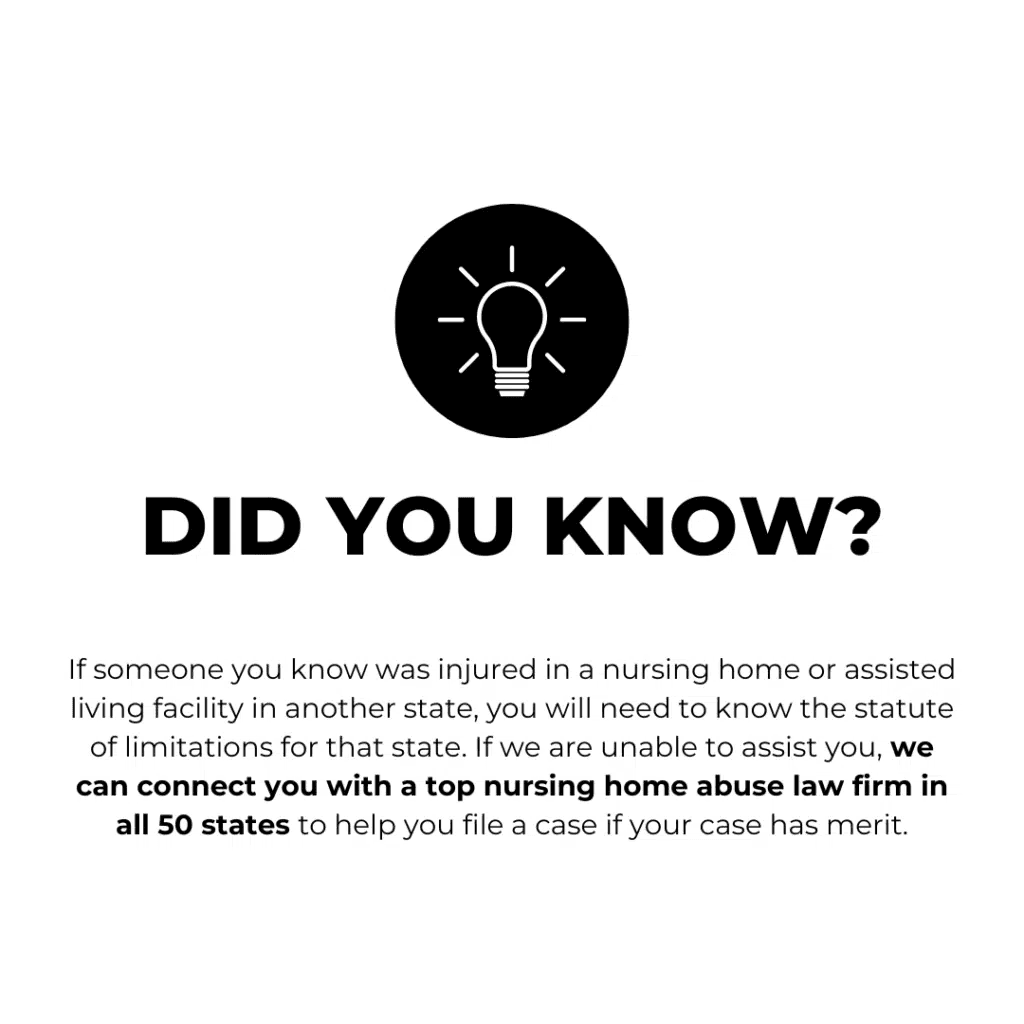
Nursing home abuse and neglect put vulnerable residents at serious risk, leading to malnutrition, dehydration, infections, and preventable injuries. When facilities fail to provide adequate care, residents suffer, and families are left feeling helpless. Lack of supervision, improper medical treatment, and unsafe conditions can result in devastating harm. Understanding the warning signs, knowing your legal rights, and holding negligent facilities accountable are crucial steps in protecting your loved ones. Learn how to take action and seek justice.
November 5, 2024
3 min
Elder abuse is a growing issue that impacts millions of older adults in nursing homes, assisted living facilities, and private homes. It includes harmful behaviors like physical violence, neglect, emotional manipulation, and financial exploitation. Many elders are vulnerable due to cognitive impairments, physical limitations, or social isolation. This makes it essential to have a thorough assessment process to spot abuse before it gets worse. Asking the right questions plays a key role in detecting abuse; these targeted questions are often the first step in uncovering problems that could otherwise be overlooked.
Practical assessment involves asking sensitive and respectful questions that cover different parts of an elder’s life. A thorough evaluation looks beyond basic checklists and takes a closer look at the elder’s physical health, emotional well-being, financial security, risk of wandering, and possible sexual abuse. This guide explores key questions in each of these areas, offering a clear approach that caregivers, healthcare providers, and legal advocates can use to detect abuse and take the right steps to address it.
The overall well-being of an elder is often the first area to assess. These questions provide a broad understanding of their situation and help identify any red flags:
These questions can reveal early signs of abuse or neglect, such as shifts in behavior, sudden isolation, or changes in living conditions. They can also expose situations where the elder feels trapped, afraid, or overly dependent on someone who may not have their best interests in mind. Often, elder abuse victims hesitate to speak out due to loyalty, fear of retaliation, or uncertainty about whether what they’re experiencing is indeed abuse. By beginning with broad questions, caregivers and professionals can gradually explore more specific concerns, paving the way for deeper conversations if potential issues arise. Building trust and creating a safe space in these early discussions is crucial for encouraging the elderly to voice any worries.
Physical abuse can range from overt acts like hitting or restraining to more subtle forms such as rough handling or withholding necessary care. Neglect, on the other hand, might manifest through untreated medical conditions, inadequate hygiene, or insufficient access to food and water. Often, elders may be reluctant to report physical abuse due to fear of retaliation, embarrassment or because they depend on the caregiver for daily needs. By asking targeted questions, caregivers and professionals can detect inconsistencies in the elder’s account, spot physical warning signs, and observe changes in behavior or body language. Key questions regarding physical health may include:
Emotional abuse often leaves psychological scars that can manifest as depression, anxiety, or withdrawal, which can severely impact an elder’s overall well-being and quality of life. These effects can lead to a decline in both mental and physical health, making the elderly more vulnerable to further abuse or neglect. Over time, consistent emotional mistreatment can erode the elder’s self-esteem, sense of security, and trust in others, making it even more challenging for them to seek help or express their distress. Identifying these subtle signs early through compassionate and direct questioning is crucial for providing support and intervention. Essential questions may include:
These questions help identify financial exploitation, which can severely impact the elderly’s independence and security. Financial abuse often goes unnoticed until it has already caused significant harm, leaving the elderly without essential resources. Detecting issues like unauthorized changes to financial documents or pressure to surrender assets early allows for timely intervention. Protecting the elderly’s financial stability is crucial to their autonomy and well-being. Loved ones of residents can ask:
Elopement, or the act of wandering or leaving a safe area unsupervised, is a risk in specific care settings like nursing homes. Asking about this risk can be crucial for ensuring safety:
Assessing elopement risk is essential for protecting individuals who may be confused, anxious, or prone to wandering. Understanding these risks allows caregivers and facility staff to implement measures that prevent dangerous situations, such as secure exits and supervision strategies. By proactively addressing the risk of elopement, facilities can create safer environments and better address the needs of residents at higher risk of wandering.
Sexual abuse is an especially sensitive area that requires careful questioning. These questions must be approached with empathy and care:
Addressing sexual abuse requires careful and empathetic questioning due to its sensitive nature. It can be challenging to identify due to fear, shame, or cognitive impairment. Victims may be reluctant to disclose abuse due to feelings of embarrassment or fear of retaliation, making it essential for caregivers and professionals to approach the topic with sensitivity and assurance. Establishing a trusting environment can encourage the elderly to share their experiences, leading to appropriate support and intervention. Recognizing and addressing sexual abuse is vital for ensuring the elder’s safety and well-being.

If someone suspects elder abuse, it’s crucial to take immediate and thoughtful action. The first step is to ensure the safety of the elderly. Contact emergency services is essential if there is an immediate threat or danger. However, in situations where the risk is not urgent but there are concerning signs, it’s necessary to gather information without directly confronting the suspected abuser. Observing the elder’s physical condition, emotional state, and environment can provide valuable details to share with authorities or professionals who can investigate further. Documenting specific incidents, dates, and behaviors can be helpful if a formal report is needed.
Reporting suspected elder abuse is a critical next step. In the United States, every state has an Adult Protective Services (APS) agency, which is responsible for investigating reports of elder abuse, neglect, and exploitation. Reports can be made anonymously, allowing the concerned party to protect their identity while helping the elderly. In addition to APS, local law enforcement, social workers, and healthcare providers can also be involved. It’s important to remember that anyone can report elder abuse—not just family members or professionals. Trusting one’s instincts and taking action, even if there’s only suspicion, can make a significant difference in stopping abuse and ensuring the elderly receive the care and protection they need.
Elder abuse assessments require a comprehensive and compassionate approach. By asking questions in critical areas like general well-being, physical health, emotional health, financial security, elopement risk, and sexual assault, caregivers and professionals can identify potential abuse and take necessary actions. Each area covers a unique aspect of the elderly’s life, providing a holistic understanding of their circumstances and ensuring their safety and dignity.
Michael Hill is a nationally recognized attorney who handles exclusively cases against long term care facilities. Michael and his firm, Michael Hill Trial Law, handle cases across the country.
Disclaimer: This information is provided for informational purposes only. Nothing in this article should be construed as providing legal advice or the creation of an attorney client relationship. Laws are updated frequently and change from state to state. If you desire legal advice, you can contact Michael Hill Trial Law at www.protectseniors.com, send an email to info@protectseniors.com, call (800) 659-2712 to begin an investigation, or contact another attorney.